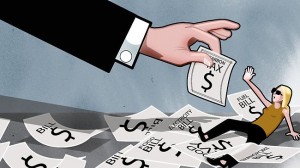Among truly ambitious people, I have learned that there are two distinct types: those who seek to improve themselves and their value to others, and those who think they can get ahead by dragging others down. There are many ways to destroy competitors, in business or in politics, but that strategy rarely produces lasting success for those who practice it.
That is a simple life lesson revealed again and again in a variety of situations. I see it often in the arena of natural resources, such as in our ongoing national debate on energy policy. Advocates of renewable energy often attempt to demonize and destroy traditional energy uses, on the theory that if we utterly destroy the use of oil, gas, and coal, people will enthusiastically embrace wind and solar power. There are several reasons it hasn’t worked, and won’t.
 Consider the carbon tax, which has been proposed often but never adopted (because Americans overwhelmingly oppose it). It nevertheless remains atop the wish list of renewable energy activists. At the risk of sounding like a broken record week after week, I want us to call it what it is – a tax on the energy all Americans need.
Consider the carbon tax, which has been proposed often but never adopted (because Americans overwhelmingly oppose it). It nevertheless remains atop the wish list of renewable energy activists. At the risk of sounding like a broken record week after week, I want us to call it what it is – a tax on the energy all Americans need.
Keep in mind that despite notable growth in renewables, over 85 percent of our energy still comes from coal, natural gas, and oil. So taxing the carbon dioxide produced by fuel use is an additional tax on everyone’s utility bills, cars, gas, and virtually all the products they buy – groceries, medicines, clothes, appliances, homes, everything.
Like most energy proposals in recent years, the argument is justified by global warming. Yet as we have discussed several times, nothing about such proposals would have any measurable impact on world climate, especially since the United States is steadily reducing its emissions already, while China and India are industrializing so rapidly that any change in American policy will be absolutely invisible. Don’t take my word for it; even the EPA agrees with that assessment (though even their own facts don’t stop them from pushing such policies).
To be consistent, many anti-energy activists support international treaties that attempt to force all countries to reduce their emissions. This year’s annual climate conference in Paris is the 21st since Kyoto, where the UN first began this charade. I call it that because China and India have never agreed to any such carbon emission reductions.
Some leaders of both parties now advocate carbon taxes, along with big corporations and some trade associations. I suspect they are simply more afraid of seeming unconcerned about the environment than about high costs that they can pass along to consumers. Some actually argue that carbon taxes are a free market approach to global warming. Perhaps it seems more palatable than simply banning the use of fuels.
A U.S. Chamber report says: “A carbon tax would allow the market to work to assign the best solution at the lowest cost to consumers… Once performance targets were set, the private sector would be able to calculate financial returns that would result in investment in the most promising solutions.” What a remarkable misunderstanding of market principles, assuming government’s use of tax policy to pick winners and losers, and business’s need to restructure accordingly, bears any relationship to private enterprise.
Backers also deny the devastating impact of such a tax on jobs. The “Citizens Climate Lobby” admits a carbon tax “will kill jobs in industries that are high-carbon emitters, but will create many more jobs in other industries than it kills in dirty industries.” Really? In Colorado alone, there are over 215,000 jobs connected to oil, gas, and coal. That’s more than the entire nationwide wind and solar industries combined. Some studies also claim the economic stimulation of a carbon tax will create more jobs, but they assume a “revenue-neutral” tax – which rebates all that revenue back to the public. If you believe Congress will ever do that with a lucrative new revenue stream, I have some swamp land in Florida for you.
The real purpose of a carbon tax is to make the use of traditional fuel cost-prohibitive, so wind and solar can compete. It would force Americans to use them, not because they choose to do so, but because all other choices have been destroyed. Here is an alternative concept: what if we were to spend as much time trying to make renewable energy cheaper and more efficient, instead of working to destroy the only sources of energy most Americans can afford?
(A version of this column originally appeared in the Grand Junction Daily Sentinel November 20, 2015.)




Comments on this entry are closed.